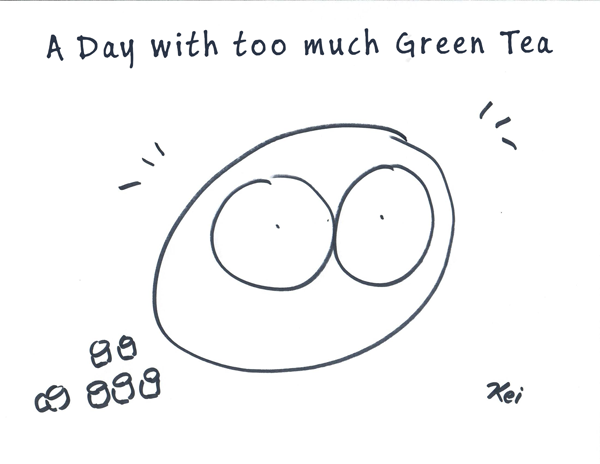Watch this 1-minute video first
You already know that green tea is a great-tasting, relaxing beverage with numerous health benefits, but can the same be said about eating the tea leaves rather than steeping them into a drink?
This is actually what many tea lovers wonder about.
Well, the answer to the question is, YES!
In fact, if you enjoy drinking Matcha, if you think about it, you are already consuming the tea leaves – you just haven`t brewed them!

Matcha is powdered form of green tea, so if you drink matcha, you are consuming the entire tea leaf.
Why Eat Green Tea Leaves Instead of Eating Matcha Powder?
This will be a natural question to ask after realizing that matcha is made from finely pulverized green tea leaves. They are actually made from grinding several green tea leaves, especially young ones – sounds perfect, doesn`t it? However, the problem here is that there might be a chance of overconsuming caffeine since you will be consuming an entire leaf per serving. The tea leaves used for matcha contain slightly higher levels of caffeine than the leaves used for brewing. For all the above reasons, 1/4 or half of the leaf will be enough to use on dishes and drinks.
Then Why Do We Brew the Tea Leaves Instead of Eating Them?
Raw and processed tea leaves are rich in antioxidants, but may be too bitter and difficult to digest. This is why, in general, tea must be brewed. The best way to eat the leaves would be after steeping.
What Are the Risks of Eating Green Tea Leaves?
Few risks are associated with eating green tea leaves, but the main risk is excess caffeine consumptionTea leaves contain slightly more caffeine than brewed tea, and it is also easy to consume a lot in a short period of time . As always, you should read the nutrition labels for serving sizes and caffeine content.
Another point to be careful of is that eating tea leaves may cause tooth decay. If you do not floss and brush your teeth well, the leaves will get stuck between your teeth. In worst cases, too much fluoride will lead to white or brown spots on your teeth.
Like drinking too much coffee, eating these leaves can be addicting. You may end up feeling like you need more caffeine in the morning before you go to work.
Can I Eat the Green Tea Leaves in Tea Bags?
This depends on the material of the tea bag and the quality of the tea leaves. Ordinary, the tea in tea bags are only green tea fragments, which you may find dusty when you eat them. Additionally, the tea bags may be made of epichlorohydrin, a type of plastic that prevents the tea bag from tearing easily; however, regardless of its useful quality, this compound will hydrolise when it comes in contact with water, and have been proven to increase the risk of diseases - just like microplastics released into your food and drinks.
The good news is, however, there is no need to fret about this information as there are tea bags that are made from organic and compostable plant materials; and these tea bags usually contain the full tea leaf. In this case, tearing the tea bag and consuming the tea leaves is safe.
Read more about the comprehensive article I wrote about green tea and caffeine here.

What are the Benefits of Eating Green tea leaves?
Green tea leaves are packed with antioxidants from the tea's catechins as well as other vitamins such as vitamins C, B1, and B2. Drinking green tea itself helps with weight loss and cholesterol reduction, improve mental alertness, and relieves digestive issues in the first place, and some studies have even shown that green tea can also reduce heart disease and prevent cancer – this means that eating the actual tea leaves will carry out the benefits in a more concentrated way, and it will definately boost your health!
However, as already mentioned, it is always best to brew the tea leaves first before you enjoy eating them. Try sprinkling them on your meals, especially over rice or salad – they give you all the powerful antioxidants without leaving any behind. Start incorporating this suferfood into your diet today!
How Often Can I Eat Them?
It's safe to eat green tea leaves every day so long as you don`t overconsume the caffeine.
One to three daily servings are ideal; however, since eating more won't hurt you, try spreading your servings of green tea leaves over the day to moderate your caffeine consumption and maximize your body's absorbency of the beneficial compounds.

What Are the Safest Ways to Prepare Green Tea Leaves?
Eating green tea leaves in any recipe is perfectly safe; however, if you want to be sure, you can always eat a small amount and see if your body reacts to it. Although not necessary, it is worth to note that it is still best to eat organic green tea leaves to avoid pesticide residues, and always remember that the tea leaves are safer to eat after steeping them.
You might be surprised to learn that serving green tea leaves over a salad is quite tasty. They are an excellent accent to Asian-style salad especially when they are combined with vinegar dressing! Simply sprinkle the tea leaves (sencha) over a salad and pour over the dressing. With time, the leaves will absorb the moisture from the dressing and are made even softer to be enjoyed as a perfect bowl of super salad!

Green Tea Salad
Green tea leaves can also be used as an herb or spice to add an earthy flavor to foods like meatballs, pesto sauce, and omelets. In addition to the earthy flavor, green tea gives these tasty main dishes a health boost.
Japanese people usually use green tea leaves after steeping. They mix the leaves with soy sauce, and serve them with rice.
They also use green tea leaves to make furikake, a type of seasoned dry food which is often used to sprinkled over steamed rice. Gyokuro is most often used for this recipe. Another popular way green tea used for meals is called ochazuke, where green tea is poured over the rice and eaten with fish, seaweed, and/or meat.
A sprinkle of tea leaves is also a great way to dress desserts like cakes, candies, and milkshakes. Matcha powder can be used to flavor breads, cookies, and other baked goods. Matcha and green tea leaves can also be blended into smoothies, even on fruit juices, or taken in capsule form. Without a doubt, green tea is an almighty ingredient!
Check out my published book, “Cook with Green Tea” for more recipes and ideas.
Is There Anyone Who Should Not Eat Green Tea Leaves?
Green tea leaves are safe for most people to consume; however, individuals with certain health conditions should avoid them. If you are allergic to green tea or any other type of tea, avoid consuming the leaves as they may provoke a stronger response than brewed tea.
People with heart conditions or who are sensitive to the effects of caffeine should also avoid green tea leaves, and pregnant or breastfeeding women should consult a physician before eating them. If you are currently taking prescription medications, ask a pharmacist if your medication may interact with green tea.
Whether brewed or prepared for eating, green tea is a delicious beverage with a number of health benefits. With all its different variations, there are endless ways to enjoy Japanese green tea. We guarantee you – it is a journey worth embarking on.
Get Free Bonus Books

Sign up for free to the Green Tea Club to get advice and exclusive articles about how to choose Japanese Tea, and tips, tricks, and recipes for enjoying Japanese tea.
About the author
Kei Nishida
Author, CEO Dream of Japan
Certification: PMP, BS in Computer Science
Education: Western Washington University
Kei Nishida is a Japanese green tea enthusiast, a writer, and the founder and CEO of Japanese Green Tea Co., a Dream of Japan Company. His passion for introducing America to the tea of his homeland was the catalyst for creating the only company that brings high-quality tea from Arahataen Green Tea Farms to the rest of the world. Learn more about Kei
























